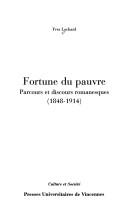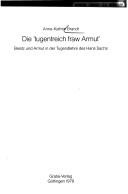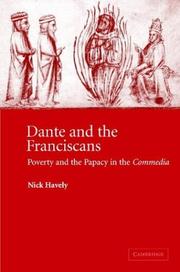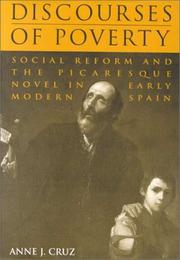| Listing 1 - 10 of 14 | << page >> |
Sort by
|

ISBN: 284292035X Year: 1998 Publisher: Saint-Denis PUV
Abstract | Keywords | Export | Availability | Bookmark
 Loading...
Loading...Choose an application
- Reference Manager
- EndNote
- RefWorks (Direct export to RefWorks)
Dissertation
Year: 1938 Publisher: Bonn : Rheinische Friedrich-Wilhelms-Universität zu Bonn. Philosophische Fakultät,
Abstract | Keywords | Export | Availability | Bookmark
 Loading...
Loading...Choose an application
- Reference Manager
- EndNote
- RefWorks (Direct export to RefWorks)
PAUVRETE DANS LA LITTERATURE --- RICHESSE DANS LA LITTERATURE
Book
Year: 1991 Publisher: Paris : Flammarion,
Abstract | Keywords | Export | Availability | Bookmark
 Loading...
Loading...Choose an application
- Reference Manager
- EndNote
- RefWorks (Direct export to RefWorks)
PAUVRES --- PAUVRETE DANS LA LITTERATURE --- PAUVRETE --- VAGABONDS --- EUROPE --- HISTOIRE --- HISTOIRE SOCIALE --- 15E-18E SIECLES --- 14E-17E SIECLES
Book
ISBN: 0921916744 9780921916741 Year: 1996 Publisher: Toronto : Ed. du Gref,
Abstract | Keywords | Export | Availability | Bookmark
 Loading...
Loading...Choose an application
- Reference Manager
- EndNote
- RefWorks (Direct export to RefWorks)

ISBN: 392183404X 9783921834046 Year: 1979 Volume: 4 Publisher: Göttingen: Gratia,
Abstract | Keywords | Export | Availability | Bookmark
 Loading...
Loading...Choose an application
- Reference Manager
- EndNote
- RefWorks (Direct export to RefWorks)
Poverty in literature --- Pauvreté dans la littérature --- Sachs, Hans, --- Philosophy --- Sachs, Hans --- -Philosophy --- Poverty in literature. --- Philosophy. --- Pauvreté dans la littérature --- Saks, Gans, --- Sachs, Johannes, --- Sachs, Hans, - 1494-1576 - Philosophy --- Sachs, Hans, - 1494-1576

ISBN: 0521833051 Year: 2004 Volume: [52] Publisher: Cambridge Cambridge University Press
Abstract | Keywords | Export | Availability | Bookmark
 Loading...
Loading...Choose an application
- Reference Manager
- EndNote
- RefWorks (Direct export to RefWorks)
Thematology --- Christian religious orders --- Dante Alighieri --- Poverty in literature --- Catholic Church in literature --- Pauvreté dans la littérature --- Eglise catholique dans la littérature --- Dante Alighieri, --- Francis, --- In literature --- Franciscans --- Pauvreté dans la littérature --- Eglise catholique dans la littérature --- In literature.
Book
ISBN: 2745311743 9782745311740 Year: 2004 Volume: 90 Publisher: Paris: Champion,
Abstract | Keywords | Export | Availability | Bookmark
 Loading...
Loading...Choose an application
- Reference Manager
- EndNote
- RefWorks (Direct export to RefWorks)
Le don au(x) pauvre(s), le don du poème : entre littérature, anthropologie, histoire et philosophie, Scènes d'aumône réfléchit au croisement de ces deux scènes. Toutes deux sont des " scènes primitives " : la première, du lien social dans l'imaginaire occidental ; la seconde, d'un certain ethos lyrique. Une " crise du don " affecte à la fois les pratiques charitables et l'effusion lyrique au XIXe siècle. La conjonction n'est pas fortuite. C'est l'hypothèse de ce livre, qui étudie la relation entre la poésie " moderne " - au sens que Baudelaire donne à ce terme- et la pauvreté, en sa phénoménalité également moderne. Qu'advient-il durapport aux pauvres à l'âge de la " misère " et du marché ? Qu'advient-il à cet âge de la conception romantique de la poésie com me " don de la langue ", telle qu'elle s'allégorise dans le motif du " don du poème " ? Quelles questions poésie et pauvreté modernes posent-elles à l'économie qui les suscite en les excluant ? Telles sont les questions abordées dans cet ouvrage. Où l'on rencontre Hugo, Desbordes-Valmore, Rimbaud, Mallarmé, Verlaine et bien sûr Baudelaire, mais aussi Derrida lisant Mauss, Levinas d évisageant le pauvre, ou encore Michelet, Heidegger et Benjamin réfléchissant sur la misère non poétisable de l'âge moderne.
Armen in de literature --- Armoede in de literatuur --- Charity in literature --- Charité dans la littérature --- Liefdadigheid in de literatuur --- Pauvres dans la littérature --- Pauvreté dans la littérature --- Poor in literature --- Poverty in literature --- French poetry --- Poverty in literature. --- Charity in literature. --- History and criticism. --- Poor --- 19th century --- Themes, motives --- French poetry - 19th century - History and criticism.
Book
ISBN: 9783515111607 9783515111614 3515111603 Year: 2015 Volume: 239 Publisher: Stuttgart : Franz Steiner Verlag,
Abstract | Keywords | Export | Availability | Bookmark
 Loading...
Loading...Choose an application
- Reference Manager
- EndNote
- RefWorks (Direct export to RefWorks)
While previous research has focused on the public discourse of wealth, little attention has thus far been paid to the perception of poverty and attitudes toward it in classical Athens. This book argues that a public discourse of poverty in Athens can be reconstructed from sources dating from the 430s to the 330s BC. Athenian democracy promoted ideas about poverty that could substantially contribute to the stability of the political system, while simultaneously differentiating between destitution and "good poverty" - the latter being a legitimate condition for a citizen and beneficial to the polis. After a preliminary discussion of the debate over the definition of poverty in the social sciences, Lucia Cecchet explores the web of beliefs and the collective imaginary of poverty that emerge from classical Athenian sources addressed to large audiences: drama and oratory. The frequency with which images and ideas about "the poor" occur in these sources testifies to an ongoing discussion of the causes and effects of poverty and even possible solutions to this social problem. These sources allow us to investigate how these topics were used in drama, in the Assembly and in the jury courts to arouse emotions and influence public decisions.
Poverty --- Poverty in literature --- Pauvreté --- Pauvreté dans la littérature --- History --- Histoire --- Athens (Greece) -- Social conditions. --- Greece --- Grèce --- Social conditions --- Civilization --- Conditions sociales --- Civilisation --- Poverty. --- Social conditions. --- History. --- Athens (Greece) --- Pauvreté --- Pauvreté dans la littérature --- Grèce --- (Produktform)Electronic book text --- Alte Geschichte --- Altertum --- Antike --- (VLB-WN)9553

ISBN: 0802044395 9786612037061 1282037064 1442673958 9780802044396 Year: 1999 Volume: *76 Publisher: Toronto, [Ontario] ; Buffalo, [New York] ; London, [England] : University of Toronto Press,
Abstract | Keywords | Export | Availability | Bookmark
 Loading...
Loading...Choose an application
- Reference Manager
- EndNote
- RefWorks (Direct export to RefWorks)
In this ground-breaking study, Anne Cruz examines the treatment of poverty, prostitution, war, and other social concerns in the cultural and literary discourses of early modern Spain. This book investigates the polemics on poor relief through religious charity and secularized reform articulated not only in the Spanish picaresque canon - Lazarillo de Tormes, Guzm¯n de Alfarache, El busc3/4n - but also in female picaresque narratives and soldiers' tales. Emphasizing Bakhtin's notion that discursive practices must be assessed as they intersect and become textualized in history, the book also looks at this literature in relation to normative writings such as royal decrees, regulations, economic proposals, synods, and sermons. Through these discourses, authors and authorities alike debated their theories of poor assistance for both men and women, from the critique of unregulated prostitution in works such as La lozana andaluza to the control of impoverished youths through military conscription as in Alonso de Contreras and Estebanillo Gonz¯lez. The rupture of the feudal system and the economic devastation of the country precipitated a dramatic rise in the number of poor, who were increasingly perceived as delinquents by an anxious populace. The book employs Foucault's paradigms of confinement and control to study the various suggestions for the social containment of Spain's marginalized elements. Positing that the literary p¦caros and p¦caras assume the role of scapegoats for this disenfranchised social Other, Cruz further argues that the picaresque novels respond dialectically to the growing demonization of the poor in early modern Spanish culture.
Armoede in de literatuur --- Pauvreté dans la littérature --- Poverty in literature --- Picaresque literature, Spanish --- Spanish fiction --- Poor in literature --- Social problems in literature --- History and criticism --- Picaresque literature [Spanish ] --- Classical period, 1500-1700 --- Poverty in literature. --- Poor in literature. --- Social problems in literature. --- History and criticism.
Book

ISBN: 9782812434884 9782812434891 Year: 2016 Publisher: Paris Classiques Garnier
Abstract | Keywords | Export | Availability | Bookmark
 Loading...
Loading...Choose an application
- Reference Manager
- EndNote
- RefWorks (Direct export to RefWorks)
Comparative literature --- Thematology --- anno 1500-1799 --- European literature --- Poor in literature --- Poor in art --- Poor --- Poverty in literature --- Poverty in art --- Poverty --- Littérature européenne --- Pauvres dans la littérature --- Pauvres dans l'art --- Pauvres --- Pauvreté dans la littérature --- Pauvreté dans l'art --- Pauvreté --- Themes, motives --- Congresses. --- History --- Thèmes, motifs --- Congrès --- Histoire --- Europe --- Social conditions --- Conditions sociales --- Dans la littérature --- Dans l'art --- Armut --- Armut. --- Kunst. --- Literatur. --- Poverty in art. --- Poverty in literature. --- Poverty. --- Renaissance --- Renaissance. --- Repräsentation --- Themes, motives. --- Europa. --- Europe. --- Littérature européenne --- Pauvres dans la littérature --- Pauvreté dans la littérature --- Pauvreté dans l'art --- Pauvreté --- Thèmes, motifs --- Congrès --- History. --- Dans la littérature. --- Dans l'art.
| Listing 1 - 10 of 14 | << page >> |
Sort by
|

 Search
Search Feedback
Feedback About UniCat
About UniCat  Help
Help News
News